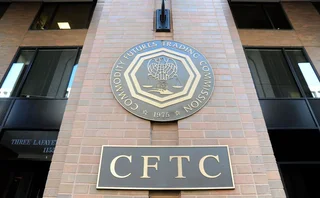
Compliance managers warned of troubles ahead
Compliance departments face regulatory challenges warns Chase Cooper
LONDON – “Expect serious new regulation as a result of the events of the past 12 months,” warned Nick Gibson, director, compliance solutions at Chase Cooper, at a compliance breakfast briefing held in London this morning.
The fallout from the credit crunch and the continuing market volatility is expected to last at least another two years, according to Gibson, and compliance managers need to be ready to face the new challenges that will emerge over the next 18 months. As highlighted in the Senior Supervisors Group’s paper on lessons learned from the crisis areas the regulators will be focusing on include ensuring firms review their risk management practices to avoid relying too much on models without the addition of expert judgement, enforcement of internal controls (also following the Société Générale rogue trader event), senior management engagement and understanding of accountability for risks, and stress-testing parameters and scenario analysis.
Bearing these areas of focus in mind, compliance managers were warned to take several steps now to prepare for the future. They should initiate greater collaboration between their risk management function and the compliance department to share information and priorities. As budgetary tensions within financial institutions increase in the illiquid environment, compliance officers need to prepare to expand and manage risk under the pressure of a cost freeze until the new regulatory focus bites. They also need to avoid over-reliance on compliance risk models and place more focus on the application of expert judgement. Reinforcing and reminding senior managers again and again about their responsibility and accountability is also a priority before the regulators do.
Firms will need to watch for unusual trading activity in their own securities at a business or senior level, and keep an eye on the behaviour of front-office staff. As traders face potential redundancy, low bonuses and sitting on portfolios that are impossible to value in the current climate, the risk of abuses ramps up. Keeping an open dialogue with regulators was also flagged as one of the top areas of concern for compliance officers.
Only users who have a paid subscription or are part of a corporate subscription are able to print or copy content.
To access these options, along with all other subscription benefits, please contact info@risk.net or view our subscription options here: http://subscriptions.risk.net/subscribe
You are currently unable to print this content. Please contact info@risk.net to find out more.
You are currently unable to copy this content. Please contact info@risk.net to find out more.
Copyright Infopro Digital Limited. All rights reserved.
As outlined in our terms and conditions, https://www.infopro-digital.com/terms-and-conditions/subscriptions/ (point 2.4), printing is limited to a single copy.
If you would like to purchase additional rights please email info@risk.net
Copyright Infopro Digital Limited. All rights reserved.
You may share this content using our article tools. As outlined in our terms and conditions, https://www.infopro-digital.com/terms-and-conditions/subscriptions/ (clause 2.4), an Authorised User may only make one copy of the materials for their own personal use. You must also comply with the restrictions in clause 2.5.
If you would like to purchase additional rights please email info@risk.net
More on Regulation
CFTC aims to settle ‘hundreds’ of enforcement cases within 30 days
Remediation initiative accompanies new effort to slash penalties for technical violations
Gilt repo clearing mandate on Bank of England’s radar
Sources say regulator mulling benefits of US-inspired regime, but is non-committal
Delving into the European Commission’s proposed overhaul of FRTB
Raft of potential changes would benefit both IMA and SA banks – but only temporarily
Why the survival of internal models is vital for financial stability
Risk quants say stampede to standardised approaches heightens herding and systemic risks
Crypto custody a bit(coin) closer after US accounting U-turn
Federal banking supervisors expected to eventually relax regimes for safeguarding digital assets
Japan’s regulator stands firm behind Basel as peers buckle
Japanese banks fear being at a disadvantage to rivals as Basel III implementation falters
EU racing to comply with active account rules
Industry wants simpler route to exemptions ahead of ‘challenging’ deadline for new clearing regime
CFTC acting chair: ‘We don’t need a Dodd-Frank for crypto’
US regulator wants real-time market surveillance; focuses on rise of liquidity risk







